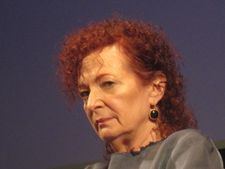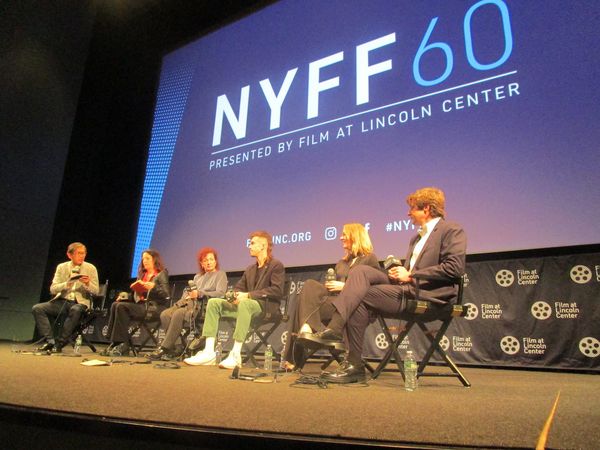 |
| Dennis Lim with All the Beauty and the Bloodshed director Laura Poitras, P.A.I.N. activists Nan Goldin, Harry Cullen, Megan Kapler, and the organisation’s lawyer Mike Quinn Photo: Anne-Katrin Titze |
Laura Poitras’s All The Beauty And The Bloodshed (Golden Lion winner at the Venice International Film Festival) on the life and career of Nan Goldin (featured in Celine Danhier’s Blank City along with Cookie Mueller and David Wojnarowicz, whose importance is also prominent here), interwoven with the fight to take down the Sackler family, was the Centerpiece selection of the 60th New York Film Festival. Noah Baumbach’s adaptation of Don DeLillo’s novel White Noise, starring Adam Driver and Greta Gerwig, opened the festival and Elegance Bratton’s The Inspection, starring Jeremy Pope with Bokeem Woodbine, Raúl Castillo, and Gabrielle Union will be the Closing Night.
At the press conference, moderated by New York Film Festival Artistic Director Dennis Lim the morning of the premiere of All The Beauty And The Bloodshed, attended by Goldin’s P.A.I.N. (Prescription Addiction Intervention Now) activist colleagues Harry Cullen and Megan Kapler, the organization’s lawyer Mike Quinn, Laura and Nan (who is also the designer of the 60th New York Film Festival posters), I commented to Nan on an observation she made in the film about photography helping her to walk through her fear.
Unlike the more stagnant expressions of ‘facing your fear’ or ‘confronting your fear’, the act of walking through fear conveys perfectly the dynamic, ongoing processes of Goldin’s forceful resolve shown in Poitras’s poignant film. The first thing we see is an Action at The Metropolitan Museum of Art on March 19, 2018 during which hundreds of empty little amber medication containers end up floating in the pond of what was then still called the Sackler Wing.
Like the protest at the Guggenheim Museum in New York during the Hilma af Klint exhibition in February 2019, when slips of paper representing OxyContin prescriptions rained down from above - the effect is a powerful work of art in itself (that Hilma would have been proud of, I bet). Nan Goldin does not hold back and lays out her struggles since childhood for our good, to fight all kinds of stigmatization and to show us that seemingly impossible obstacles can be overcome. Images from her slideshows and her other works provide the beauty to the bloodshed.
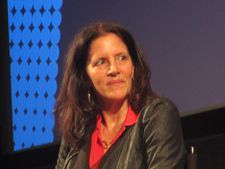 |
| Laura Poitras: “I feel that my films are portraits, I don’t use the word biography.” Photo: Anne-Katrin Titze |
The retrospective exhibition Nan Goldin: This Will Not End Well at the Moderna Museet in Stockholm opens on Saturday, October 29. Nan Goldin was the still photographer on the set for Sara Driver’s 1986 feature Sleepwalk (a New Directors/New Films at 50: A Retrospective pick) and an accident victim in Sara’s 1981 short You Are Not I (a 2011 New York Film Festival Masterwork selection).
Anne-Katrin Titze: At one point you say that you discovered photography as a way to walk through fear - which is a very striking sentence. And I thought, does the activism also connect in a way with walking through fear?
Nan Goldin: Absolutely. That’s a very good point. I’ve never heard that. Absolutely. Actually coming out of the clinic after years of addiction I didn’t understand the world at all. But I could see that things were really dark and I had to do something to push back. So I found my fight and it kept me sober. They say in recovery movement you need something bigger than yourself. And this fight became bigger than myself. So yeah, it’s a way to walk through fear, well said. Thank you!
Harry Cullen: That just makes me think also of - one of the major scenes for me in the film is when Nan speaks publicly at a hearing in front of New York State Assembly members about needing and using medication as just a treatment and being on buprenorphine, which is something I know you [to Goldin] weren’t ready to be public with when we started doing this.
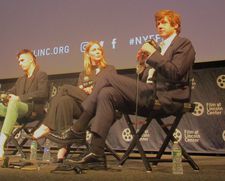 |
| P.A.I.N. activists Harry Cullen and Megan Kapler with lawyer Mike Quinn Photo: Anne-Katrin Titze |
And finding the strength and walking through that fear to say that publicly and provide inspiration and support for other people who are doing the same thing or need the same thing is something that I think this film will continue to inspire people with that and to help people with that.
And medication assisted treatment is so fundamental to recovery for people, whatever part of recovery they might be in. And Linda B. Rosenthal in that scene is one of our State Assembly women here in New York and is an incredible advocate for progressive drug policy that centers on harm reduction and meeting people where they’re at, which is what’s successful.
A question is brought up about the music and if Nan had any input. [She is credited as music consultant in the end credits]
NG: I was the music consultant. Most of that music I brought on. And the composers [Sidewalk Collective] were friends of mine for the score parts and I brought them on, too. Yeah, I worked very closely on the music. For me film music can make or break a film. Basically I watch anything that Jonny Greenwood does [Paul Thomas Anderson’s favourite composer - Licorice Pizza, Phantom Thread, Inherent Vice, The Master, There Will Be Blood], even if I don’t like the film.
Dennis Lim: It sounds like you really expanded the scope of the project in the sense of it being not just about Nan and P.A.I.N., and Nan’s activism but about her life and work, which seems like a very signature Laura Poitras move. I think all of your films are about finding the political through the personal.
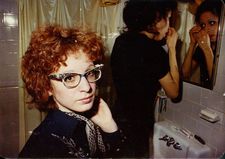 |
| Nan Goldin on discovering photography as a way to walk through fear: “I found my fight and it kept me sober.” Photo: courtesy of Nan Goldin |
Laura Poitras: Yeah, I feel that my films are portraits, I don’t use the word biography. It’s a portrait of an artist who is engaged in a political struggle. In our first meeting, Nan told me about Witnesses Against Our Vanishing, which I didn’t know about. Of course I knew David Wojnarowicz’s work, but I didn’t know that she had done this extraordinary exhibition at the height of the tragic AIDS crisis and that it created this national outcry of sort of culture wars conversation.
When Nan told me that she had curated the show, that she had made that choice, I knew that that was going to be an anchor. I knew that this film had to go into the past and there had to be convergence between that historical moment and what we’re dealing with today. Because I think this country has a tendency for amnesia.
You know we went through the AIDS crisis so why isn’t there universal health care in this country? Like how much more suffering and death does this country need to go through before basic human rights are met? There was also something about Nan being on the right side of history over and over again.
DL: I want to actually talk about the use of Nan’s work within a film, the photographs and the slide shows. It’s so interesting the context in which you see these images, whether they’re photographs on a wall or in a book or actually here in a cinema. I think there’s a real power in seeing them within the context of a film as communal experience in a big dark room like this. I’m curious how you thought about using these slide shows within a movie.
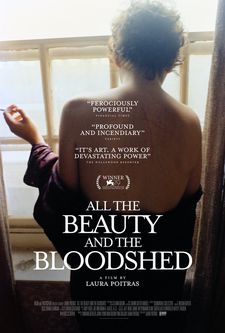 |
| All The Beauty And The Bloodshed poster |
LP: I mean in a way they were pillars, they were anchors. Nan has done such extraordinary work about her life and they are sort of pillars that hold the film up. Hopefully the audience who sees the film will also encounter the slideshows because they are so incredible. The ideal situation is that the work can sit alongside each other.
NG: You know my practice is slideshows. I show them, as you talked about, in a dark theater as a communal experience, very visceral and emotional and that’s my work. The other is kind of tangental, prints and the books. I love them but they’re tangental to the major work. I’m about to have a retrospective that is only slideshows.
For me slideshows are the closest I can come to making movies. And the advantage is that you can constantly edit them and update them, which you can’t with a movie. I have that freedom. In this exhibition coming up I am going to be presented as a filmmaker, which is what I wanted to be presented as since I was 15. And I hope people get to see the slideshows because that’s the real experience. She used small parts of them but they run anywhere from 15 minutes to 45 minutes.
Megan Kapler: In terms of P.A.I.N., the interesting thing about our group is that we answer to no one except what our group is deciding on a weekly basis. We don’t have outside funding. I think our biggest donation was $10,000 early on, but we, through Nan’s leadership really confront systems that do scare us and do scare other people from confronting them, but I think with Nan walking through her fear as what was said before, we have the freedom to take on Purdue and address McKinsey and take on other systems of oppression that we feel fit. And we don’t feel limited because we are grassroots truly.
HC: I will say that organising our Actions, it has always been important for us to have physical presence. First and foremost having a physical presence and connecting with the people in the space that we’re at was the starting point for a lot of our Actions. Certainly going from that and plugging into our media contacts and helping to speak through the media rather than to them was always a huge thing that we took from Act Up and developing a visual language that could be striking. For me that New York Times image of the Guggenheim Action went all around and people still remember it because of the striking image.
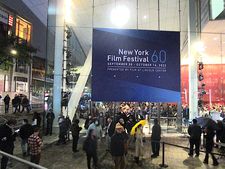 |
| The New York Film Festival première of All the Beauty And The Bloodshed was at Alice Tully Hall Photo: Anne-Katrin Titze |
I think finding ways to break down a complicated stump speech into a simple distributable kind of image or piece like that became something that we figured out along the way. Like Megan said, picking a free night at a museum because we knew that it would be packed and at some point people would lose track of who was us and who wasn’t was a really big part of it.
And getting it on the nightly news that evening hours after we were there and then it flies around and gets into the press. But I think social media has never been for us one of our biggest strengths but the way that we can coalesce with other groups through that, especially grassroots groups in New York, like Megan said, we’re pretty tight, we’re on shoestring budget and we don’t have that many people in P.A.I.N. itself.
But groups in New York like Vocal-NY, Pharm Farm, Housing Works, Act Up New York are groups that we look to that lead us through the harm reduction part and the grassroots part. We would take those messages, amplify them, learn from them and use Nan’s stature and the attention that P.A.I.N. had garnered to try to spread that as much as we could.
NG: I don’t really think about the risks. Like when I want to do something, I get obsessed, there’s no stopping me. And I hope more people get obsessed from reading your [to the audience at the press screening] articles. I hope I read something soon that tells me the new path to go on and whom to go after next.
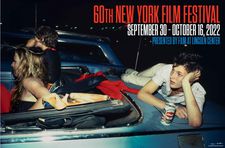 |
| One of the 60th New York Film Festival posters designed by Nan Goldin |
Nan Goldin: This Will Not End Well exhibition at the Moderna Museet in Stockholm is comprised of The Ballad of Sexual Dependency (1981–2022) her magnum opus; The Other Side (1992– 2021) a historical portrait produced as an homage to her trans friends whom she photographed 1972–2010; Sisters, Saints and Sibyls (2004–2022) a testament to the trauma of families and suicide; Fire Leap (2010–2022) a foray into the world of children; Memory Lost (2019–2021) a claustrophobic journey through drug withdrawal, and Sirens (2019–2020) a trip into drug ecstasy.
Nan Goldin: This Will Not End Well opens on Saturday, October 29, 2022 through Thursday, February 2, 2023. Moderna Museet will present Nan Goldin: This Will Not End Well at the Stedelijk Museum in Amsterdam (August 2023 – January 2024); Neue Nationalgalerie in Berlin (Oktober 2024 – March 2025), and Pirelli HangarBicocca in Milan (March 2025 – July 2015).
All The Beauty And The Bloodshed opens in New York on November 23. At the IFC Center Q&As with Laura Poitras following the 7:00pm screening on opening night and on Saturday, November 26 after the 4:10pm show. In addition: November 25, 7:00pm at BAM Rose Cinema, Brooklyn and November 26, 6:15pm at Film at Lincoln Center.








